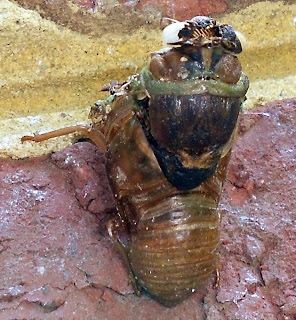My absolute favorite time in summer
is the early evening when the intense heat of the day has cooled
and the cicadas begin to sing their strange song as prelude to the coming night.
And this week the cicadas have been singing to the heights of their beings.
What a chorus we have heard mid-morning and late evening here in the Shire.
All this singing is welcome,
but the thing that made me think of cicadas this week was
that I happened upon the most unusual sight.
I noticed this strange thing stuck to the brick foundation of our house:
This insect had to have been the inspiration for the term "bug-eyed":
It is an annual cicada--called a dog day cicada in some places.
This is not the perennial one that returns every thirteen or seventeen years
and damages young trees with the violence of its egg-laying habit.
Nor is this creature the agriculturally destructive locust
although people sometimes call it that (I used to).
This is the cicada that sings during the day but not at night.
Nocturnal singing is a task that falls to the katydid,
which looks like a bright green grasshopper;
some varieties of katydid even look like green leaves.
For years I thought the cicadas and the katydids were the same insect.
We were excited to witness this ebony and emerald fellow
emerging from his exoskeleton.
I know it's nature, but really,
this separation process looks a little grotesque,
like it's a creature from outer space erupting from an unwitting host:
In this next view, he looks like an equestrian practicing dressage,
or if one is in a really, really dark mood,
one of the horsemen of the apocalypse:
Regardless of its painfully ugly appearance,
I had high hopes that there would be a sleek and glossy cicada
soon zipping about my yard.
But when I checked in on "Wally's" progress the next day,
(fully expecting to find only a crunchy brown shell attached to the wall),
the news was not encouraging. There was a failure to launch, so to speak.
Not only did poor Wally fail to fully exit his shell and spread his wings,
he was also the guest of honor at a well-attended ant luncheon.
I'm not sure they were the cause for Wally's early departure from this life,
but they were dining when I arrived.
It's more probable that earlier in the day
one of the robins gorging itself on ripe figs
one of the robins gorging itself on ripe figs
decided it needed something more substantial for brunch
and saw Wally the cicada halfway through his metamorphosis.
We'll never know for certain.
But ouch. He was so close.
<>




No comments:
Post a Comment